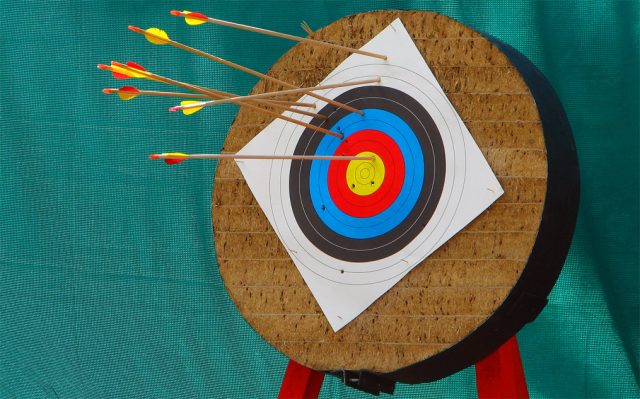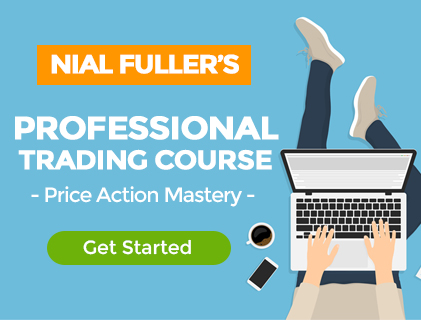Why Perfect Trading Is The Enemy Of Good Trading
 How much is enough? How much researching, chart-watching and just general thinking about your trading is harmful? How does doing too much trading related activity hurt your chances of trading success? In today’s lesson, we are going to discuss these topics and delve deeper into why you may indeed be self-sabotaging your trading simply by doing too much of everything.
How much is enough? How much researching, chart-watching and just general thinking about your trading is harmful? How does doing too much trading related activity hurt your chances of trading success? In today’s lesson, we are going to discuss these topics and delve deeper into why you may indeed be self-sabotaging your trading simply by doing too much of everything.
You can call it “micro-management” or you can call it “over-thinking” or “over-analysis”, but no matter the label given, the intent is the same: Control.
Perhaps at the very root of this problem of micro-managing one’s trading, is fear. When a person is afraid of losing their money, they will do anything they can to try and take control. However, in trading, trying to control the market is futile, it’s actually impossible. The only thing within your control as a trader, is yourself and your thoughts and actions in the market, that’s it.
Here are 5 of the best pieces of insight I can share with you to help you let go of the need to control the market:
1. Learn what you can and cannot control
Many traders try to control everything, and this thinking leads them to being unable to mentally handle a trade that is quickly moving against them or a trade that just barely misses their profit target and then reverses. These are just two of many examples of the consequences of being afraid and thus trying to control everything in one’s trading.
First off, stop trying to know everything. You can never know every single piece of data that is underlying a swing up or down in a market. In other words, you can never really know why a market is moving in the direction it’s moving, all you can know for sure is what has happened before and what is happening now, from that, we can use several different price action strategies to build a framework into the future for what MIGHT happen next. But, it’s important to understand that digesting more and more and more trading news, or even staring at the charts for hours and hours, is simply not going to help you figure out what will happen next. You can’t know what WILL happen, only what MIGHT happen. Remember, we are ‘playing the odds’ of our trading edge in the market, not acting on certainties.
You can never know what will happen FOR SURE in the market, until it happens (and it’s too late to take advantage of). So, as traders, we are trying to make consistent money in a game with inconsistent outcomes, not easy to do, especially if you have not yet accepted the outcomes are going to be inconsistent. However, it can be done, you can make money trading but NOT if you are micro-managing every aspect of the trading process and trying to control the market. It’s what so many of us get caught up in when trying to run our trading or our businesses or even our relationships.
The need to control all the small things in our work place, our trading and our relationships, can and usually will back-fire on us and cause a world of stress and anxiety.
When you finally understand, accept and then LET GO of the primal urge to control the market and micro-manage every little detail by believing more information will give you more control over your trade outcomes, you will be entering the beginning phases of the proper trading mindset. Trading success is mostly the result of proper mental thinking patterns and then using those to control one’s behavior in the market; proper routines turn into proper habits, etc. Once you master yourself, you will begin to see improved trading performance over the long-run. That may sound cliché’, but it’s very true as well.
2. Plan the trade and trade the plan
Yes, it seems like an overused trading cliché to say, “Plan the trade and trade the plan”. However, if you have a simple trading plan that you stick to without exception, then you are on your way to trading mastery. You need to build into your trading plan rules that say you will not over-think, not micro-manage, you then read this plan before you look at the markets each day. Also, build in time away from the markets so that you have a way to reset and regroup. You need a scheduled daily trading routine, so you aren’t sitting there all day trying to think of everything that may affect a market a.k.a micromanage. Your goal should be to only think about your trades and the market when you are looking at the charts, if you find yourself otherwise consumed with them, you’re doing too much.
Also, if you insist on micromanaging your trading to the point of always waiting for the ‘perfect’ setup to form, you’re going to miss some profitable moves. There is no perfect setup because every price action setup is going to look a little different than the previous ones, so just take a good one and manage it properly – don’t miss good trades because you’re waiting for a ‘perfect’ one! Your trading plan should show you the general market conditions that you’re looking for as well as your favorite trade setups to use as entry criteria, but these will be guidelines and remember you aren’t going to find the exact same trade twice; there is some discretion and skill involved and over time, education and practice you will become more in-tune with the market and the particular conditions you look for to enter it.
3. Accept a potential loss before entering the trade
A big reason traders don’t accept losses is micro-managing. Micro-managing means you’re trying to control everything, every little detail. People who get caught up over-managing their trading tend to think if they can adjust for every little variable, they can avoid losses somehow. Or, they start to think that since they’ve spent such a huge amount of time studying and researching that they are somehow able to avoid losses due to their ‘vast knowledge’ of trading.
You can’t avoid losses – they are as much a part of trading as your blood is a part of you. So, all you can do is figure out how to best manage them and remember to always understand that any singular trade can result in a loss.
This will remove an element of stress as soon as you place your trade. There are costs and expenses associated with doing business. For traders, a loss is a running cost. Accept it.
4. The WORST side-effect of micro-managing your trading is…
Over-trading or trading too much is the biggest problem that results from micro-managing your trading and trying to control the market. When we start to pay too close attention and do too much research and thinking about the markets and trading, when inevitably start to come up with too many trade ideas and start seeing patterns that probably are nothing more than market noise.
When you are watching the charts for too long you are also micro-managing them. Sitting there all day watching the intraday charts trying to pick every little move in the market; THAT is micro-managing the market!
It’s just like a boss in a company watching his employees work all day instead of just minded his business and letting them be. Yes, by watching them work all day he will probably notice some things he doesn’t like, but is this tactic likely to cause more good than it harms? How annoyed will the employees be with this micro-managing and how excited will they be to return to work tomorrow and most importantly for the business, how productive will they feel like being?
The solution to this is to just find your edge, read this article (our last one) and stick to that edge – don’t’ trade if it’s not there. It’s really quite simple. This is where your trading routine comes in – follow your daily routine of analyzing the markets, checking for setups that meet your plan and if nothing is there, you WALK AWAY until tomorrow. Which leads me nicely into my next and final point…
5. The ultimate key to stop micro-managing your trading…
You can waste a gigantic amount of precious mental energy watching the market as it ticks up and down all day. Simply turning off your screens / closing the computer and walking away, may be the ultimate (and simplest) strategy to eliminate micro-management of your trading and of the market.
As mentioned earlier, you actually need to build into your trading routine some time off from the market, to reset and regroup so that you come back re-focused. Schedule when you will look at the markets and when you will not.
It’s a fact that longer-term investors do better than shorter-term or day traders, so start thinking more like a swing / position trader or even a long-term investor and less like a day trader. Investors do not look at the charts all the time, because they know this is counter-productive. Instead, they let their positions run their course without constantly watching them, knowing that watching them too much is going to hurt and not help.
Conclusion
If you are someone who feels the need to control everything and everyone around you and micro-manage everything, you honestly may want to re-think if trading is for you. That may sound harsh, but it’s either that or make some mental and behavioral changes if you want to be a successful trader. Trading success is largely the result of letting go of things. You must let of your trade once it’s live, set it and forget it. You have to let go of your desire to control and be in control of the market. Being too involved with ANYTHING, whether its relationships, business, or trading is usually a terrible idea that often brings you the opposite of what you want.
The market is an entirely separate entity from you that literally is not alive and has no idea that you exist, no emotions. It’s just a reflection of millions of participants buying and selling – you cannot control that. You can only find a trading edge and use that edge to exploit predictable movements that will repeat themselves over time. Humans are repetitive, and their trails are left on the charts by price action – you learn to read the price action and find the repetitive entries and market conditions and then you CONTROL YOURSELF and you can make money, that is really the only way.
What did you think of this lesson? Please share it with us in the comments below!






It is easier said than done but it is a great article.As a trader just stick to your plan the outcomes may vary that is a fact.The market has bigger players than the retail traders so twitch your plan to as the market teaches you because it will always teach you on daily basis.Thank you Nial Fuller.
Very strong article. Thanks for your help.
How I wish I read your articles earlier, all of them is like you reading me through. I have blow away my account but after reading you articles am not giving up. I will use you advices to get better. Thank you so much.
Thank you for this advice you put things in the right perspective
simply one of the best pieces of advice ever in trading or life in general , great mentor
thanks Nial, cheers mate.
nice post
Thanks Nial great article indeed
i agree with you
A truly excellent and life changing article for someone with my (now previous) trading style.
Paradoxically, I wouldn’t have found it if I hadn’t wanted to know everything.
Thanks
Well done, Nial. According to me this is one of the most informative and relative articles I have read. Amazing how I had to read this article to realize how guilty I was of being a control freak and to have that wow moment. Great job!
Thanks for sharing
A wonderful article and also contains the basic advises one should know before starting a professional trading.
Very appropriate and significant insight and advise Nial. Thank you for sharing them with us. It is a big help to us new in this trading. Keep up the good work and more power to you Nial.
Thanks for sharing.
Hi Nial
Great inspiration. You always have great insight into what I am looking to improve my trade management skills
I am trying hard to stay into my trading routine. It is very difficult not to look at the charts during the day. At least i am able to only entering in a trade when the setup shows up.
Thanks for the article Nial.
I found that coment here, and i came to say that less than 3 months after writing this coment above, now I am able to not looking at the lower time frames than the Daily chart! And I also can cheking the market only one time at the day. Nial, thank you. I am getting better each day.
God bless you.
As an aspiring trader I find your lessons very educating.
You got to be psychic, it is spooky in a good way knowing were I am at with my trades. Your always welcome in my simple mind.
Really enjoyed this article, Nial. Found it is a little “painful” to read but that tells me there is truth in what you write and it is my ego that sometimes doesn’t want to hear! Thanks for putting articles like this out there for all to read.
Hey Nial,
You are always on point. Very practical and real. The set and forget principle is very powerful. After practicing it for sometime, i realize it is embedded in capital preservation. Meddling in trades can destroy trading accounts or put it a korshiorkor situation. The best form of trade management is to simply “do nothing”.
God bless you Fuller, continue educating us.
Brilliant article Nial!!!! The key to successful trading!
Your right great mentor, recently I was right in almost all my trade, but due to this single act of micro managing I couldn’t make a single dime from all of them, I was jst entry and exiting on every thick of the candle against my positions. Thks for your effort in addressing this issue, I believe it will go a long way towards making us a great trader if properly followed.
Hello Nial
Well I am that kind of person who analyses a lot and likes to keep control of everything .
That’s why I find trading challenging but hey Nial, following your articles and real advises and tips I can see improvements in trading and life and letting things be .
Thanks Nial for sharing
You are the best
Have a good day .
Adri
I like this line alot “So, as traders, we are trying to make consistent money in a game with inconsistent outcomes, not easy to do, especially if you have not yet accepted the outcomes are going to be inconsistent.” Another educative article from a pro trader. Thanks
Very clever. Not only in trade has there been no agreement for what is true or correct for a very long time.
In fact, it largely depends on trivial daily activities and determines the results. Quite different.
That is an excellent, well presented article that contains so many truths about trading. One of your best!